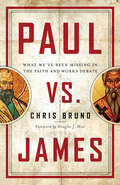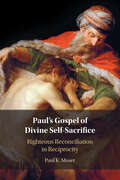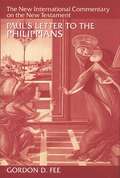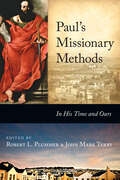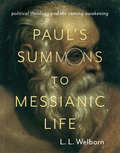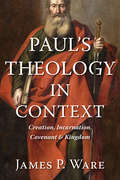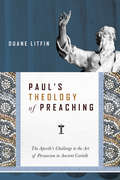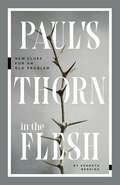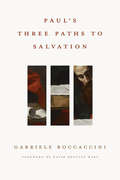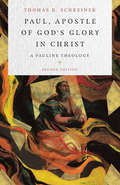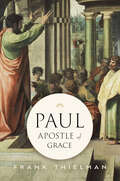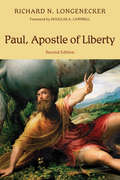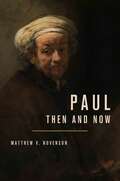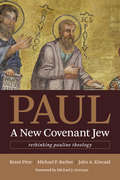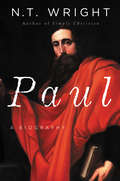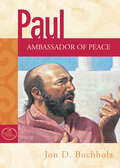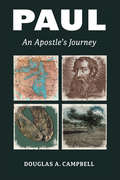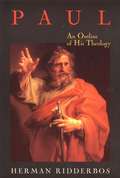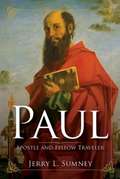- Table View
- List View
Paul vs. James: What We've Been Missing in the Faith and Works Debate
by Chris Bruno"I welcome Chris Bruno&’s readable and thoroughly biblical exploration of faith and works. He sets the matter in both its wider biblical context at the same time as he makes clear its relevance and importance to faithful Christian living today." –Douglas J. Moo from the ForewordEverything you never knew about the men behind the controversy.Put James and Paul next to each other and some tough-to-answer questions come up. Paul says we&’re saved by faith alone, not works—and James seems to say the opposite. If you&’ve been around the church for a while, you probably know enough to say "the right thing" if someone asked about these verses. But would your answers hold up to scrutiny? If pressed, would you know what to say? Dive into the life stories of both apostles, learn more about the context of their letters, and discover the truth about the shared message they both proclaimed. No more canned answers or lingering questions, gain confidence and go deeper in Paul vs. James.
Paul's Gospel of Divine Self-Sacrifice: Righteous Reconciliation in Reciprocity
by Paul MoserIn this book, Paul Moser explains how self-sacrificial righteousness of a reparative kind is at the heart of Paul's gospel of God. He also shows how divine self-sacrifice authenticates that gospel via human reciprocity toward God in reconciliation. A basis for this reciprocity lies in a teaching of ancient Judaism that humans are to reciprocate toward God for the sake of an interpersonal relationship that is righteous and reconciled through voluntary self-sacrifice to God. Moser demonstrates that Paul's gospel calls for faith, including trust, in God as reciprocity in human self-sacrifice toward God. Although widely neglected by interpreters, this theme brings moral and evidential depth to Paul's good news of reparative redemption from God. Moser's study thus enables a new understanding of some of the controversial matters regarding Paul's message in a way that highlights the coherence and profundity of his message.
Paul's Letter to the Philippians (New International Commentary on the New Testament (NICNT))
by Gordon D. Fee"“. . . undertaken to provide earnest students of the New Testament with an exposition that is thorough and abreast of modern scholarship and at the same time loyal to the Scriptures as the infallible Word of God.”"This statement reflects the underlying purpose of The New International Commentary on the New Testament. Begun in the late 1940s by an international team of New Testament scholars, the NICNT series has become recognized by pastors, students, and scholars alike as a critical yet orthodox commentary marked by solid biblical scholarship within the evangelical Protestant tradition.While based on a thorough study of the Greek text, the commentary introductions and expositions contain a minimum of Greek references. The NICNT authors evaluate significant textual problems and take into account the most important exegetical literature. More technical aspects — such as grammatical, textual, and historical problems — are dealt with in footnotes, special notes, and appendixes.Under the general editorship of three outstanding New Testament scholars — first Ned Stonehouse (Westminster Theological Seminary, Philadelphia), then F. F. Bruce (University of Manchester, England), and now Gordon D. Fee (Regent College, Vancouver, British Columbia) — the NICNT series has continued to develop over the years. In order to keep the commentary “new” and conversant with contemporary scholarship, the NICNT volumes have been — and will be — revised or replaced as necessary.The newer NICNT volumes in particular take into account the role of recent rhetorical and sociological inquiry in elucidating the meaning of the text, and they also exhibit concern for the theology and application of the text. As the NICNT series is ever brought up to date, it will continue to find ongoing usefulness as an established guide to the New Testament text.
Paul's Letter to the Philippians: A Socio-Rhetorical Commentary
by Ben Witherington IIIInterprets Paul’s letter in light of its rhetorical content and cultural contextSkeptical of the trend among many biblical scholars to analyze Paul’s short, affectionate letter to the Philippians in light of Greco-Roman letter-writing conventions, Ben Witherington instead looks at Philippians as a masterful piece of long-distance oratory — an extension of Paul’s oral speech, dictated to a scribe and meant to be read aloud to its recipients. Witherington examines Philippians in light of Greco-Roman rhetorical conventions, identifying Paul’s purpose, highlighting his main points and his persuasive strategies, and considering how his original audience would have heard and received Paul’s message.
Paul's Missionary Methods: In His Time and Ours
by Robert L. PlummerMissionary Methods: Saint Paul's or Ours?Paul's Missionary MethodsMichael F. BirdEckhard J. SchnabelBenjamin L. MerkleChristoph W. StenschkeDon N. Howell Jr.Craig KeenerDavid J. HesselgraveMichael PocockEd StetzerM. David SillsChuck LawlessJ. D. Payne
Paul's New Perspective: Charting a Soteriological Journey
by Garwood P. AndersonThe debate between proponents of the Old and New perspectives on Paul has been followed closely over the years, consolidating allegiances on either side. But the debate has now reached a stalemate, with defectors turning to apocalyptic and other solutions. Garwood Anderson recounts the issues and concludes that "both 'camps' are right, but not all the time." And with that teaser, he rolls up his exegetical sleeves and proceeds to unfold a new proposal for overcoming the deadlock. But in a field crowded with opinions, could anything new emerge? Anderson's interaction with Paul and his interpreters is at the highest level, and his penetrating and energetic analysis captures attention. What if Paul's own theological perspective was contextually formed and coherently developed over time? Have we asked justification to carry a burden it was never meant to bear? Would fresh eyes and a proper sequencing of Paul's letters reveal Paul's own new perspective? Might we turn a corner and find a bold and invigorating panorama of Pauline soteriology? This is a Pauline study worthy of its great theme, and one that will infuse new energy into the quest for understanding Paul's mind and letters.
Paul's Summons to Messianic Life
by L. L. WelbornTaubes, Badiou, Agamben, Žižek, Reinhard, and Santner have found in the Apostle Paul's emphasis on neighbor-love a positive paradigm for politics. By thoroughly reexamining Pauline eschatology, L. L. Welborn suggests that neighbor-love depends upon an orientation toward the messianic event, which Paul describes as the "now time" and which he imagines as "awakening." Welborn compares the Pauline dialectic of awakening to attempts by Hellenistic philosophers to rouse their contemporaries from moral lethargy and to the Marxist idea of class consciousness, emphasizing the apostle's radical spirit and moral relevance.
Paul's Summons to Messianic Life: Political Theology and the Coming Awakening (Insurrections: Critical Studies in Religion, Politics, and Culture)
by L. WelbornTaubes, Badiou, Agamben, i ek, Reinhard, and Santner have found in the Apostle Paul's emphasis on neighbor-love a positive paradigm for politics. By thoroughly reexamining Pauline eschatology, L. L. Welborn suggests that neighbor-love depends upon an orientation toward the messianic event, which Paul describes as the "now time" and which he imagines as "awakening." Welborn compares the Pauline dialectic of awakening to attempts by Hellenistic philosophers to rouse their contemporaries from moral lethargy and to the Marxist idea of class consciousness, emphasizing the apostle's radical spirit and moral relevance.
Paul's Theology in Context: Creation, Incarnation, Covenant, and Kingdom
by James P. WareThis accessible text by James P. Ware provides both a concise guide to Paul’s theology and a general introduction to the key issues and debates in the contemporary study of Paul. Examining Paul’s message in the context of the ancient world, Ware identifies what would have struck Paul’s original audience as startling or unique. By comparing Paul’s teaching to the other religions and philosophies of that day, Ware presents a fresh perspective on Paul’s theology, revealing four pillars of his thought: creation, incarnation, covenant, and kingdom. After examining each of these dimensions of Paul’s gospel, Ware explores the historical role of Paul within Christian origins and the astounding evidence embedded in his letters regarding the beginnings of Christianity and the eyewitness origins of the gospels. Clergy, students, and laypeople will find that this guide to the big picture of Paul’s theology will illumine and enliven the study, preaching, and teaching of all the Pauline letters.
Paul's Theology of Preaching: The Apostle's Challenge to the Art of Persuasion in Ancient Corinth
by Duane Litfin"We preach Christ crucified: a stumbling block to Jews and foolishness to Gentiles, but to those whom God has called, both Jews and Greeks, Christ the power of God and the wisdom of God." When Paul preached about the crucified and risen Jesus Christ to the church at Corinth and elsewhere, did he follow the well-established rhetorical strategy of his day or did he pursue a different path? And what does that mean for the preaching of the church today? Through a detailed analysis of 1 Corinthians 1-4, Duane Litfin explores the rhetorical context of Paul?s preaching and his own understanding of his task as a preacher. What is revealed in this investigation is a sharp distinction between Greco-Roman rhetorical strategies, which sought to persuade, and Paul?s theology of preaching, which was based on the model of an obedient herald. This revised and expanded version of Litfin's previous St. Paul's Theology of Proclamation will provide insight to those engaged in Pauline and New Testament studies, rhetorical theory, and Greco-Roman studies. Moreover, by offering a better understanding of Paul's method as well as the content of his declaration concerning "the power and wisdom of God" revealed in Jesus, this book will help preachers as they undertake the ongoing task to "preach Christ crucified."
Paul's Thorn in the Flesh: New Clues for an Old Problem
by Kenneth BerdingSolving the mystery of Satan's messenger Paul's enigmatic "thorn in the flesh" in 2 Corinthians has baffled interpreters for centuries. Many offer suggestions as to the identity of Satan's messenger; others despair that the puzzle is unsolvable. In Paul's Thorn in the Flesh: New Clues for an Old Problem, Kenneth Berding reopens the case. He follows a trail of clues that includes ancient beliefs about curses, details from Paul's letters, Jesus's own suffering, and the testimony of the earliest Christian interpreters. Berding offers twenty criteria—some familiar, others neglected—that any proposal must explain. While the usual suspects fall short, Berding suggests a new solution—one that satisfies all the evidence and gives us a fuller view of Paul. Far from an abstract puzzle, Paul's own suffering is relevant to Christians today. Paul's Thorn in the Flesh is an accessible study that casts new light on Pauline studies, first--century background, and theological and pastoral concerns.
Paul's Three Paths to Salvation
by Gabriele Boccaccini&“We no longer need to separate Paul from Judaism in order to claim his Christianness,&” writes Gabriele Boccaccini, adding, &“nor do we need to separate him from the early Jesus movement in order to state his Jewishness.&” With this guiding principle Boccaccini unpacks the implications of Paul&’s &“belonging&” simultaneously to Judaism and Christianity to arrive at the surprising and provocative conclusion that there are in fact three means of salvation: For Jews, adherence to Torah.For gentiles, good works according to conscience and natural law.For all sinners, forgiveness through faith in Jesus Christ.Paul&’s Three Paths to Salvation is an attempt to reconcile the many facets of Paul&’s complex identity while reclaiming him from accusations of intolerance, and Boccaccini&’s work in reestablishing the figure of Paul as a messenger of God&’s Mercy to the sinners is an important contribution to the ongoing conversation about Paul&’s place in the contemporary pluralistic world.
Paul, Apostle of God's Glory in Christ: A Pauline Theology
by Thomas R. SchreinerThe theology of the apostle Paul is complex, set forth in numerous occasional letters, and subject to a seemingly endless variety of interpretations. How should students of Scripture engage the challenging task of discerning the shape of Paul's thought?Paul, Apostle of God's Glory in ChristPaul, Apostle of God's Glory in Christ
Paul, Apostle of Grace
by Frank ThielmanAn engaging and accessible introduction to the life and world of Paul In this fresh and engaging survey, Frank Thielman introduces readers to the life and world of the apostle Paul. Drawing on the Acts of the Apostles and Paul&’s canonical letters as well as noncanonical sources and archaeological records, Thielman constructs a vivid picture of the complex historical period and fascinating cultures in which Paul worked. At the same time, Thielman guides readers toward a deeper understanding of who Paul was, what he believed, and how he carried out his ministry. Solidly grounded in Paul&’s own writings as well as scholarly research, the book explores a wide range of compelling questions: What drove Paul to endure often treacherous journeys of hundreds of miles to establish like-minded communities around the world as he knew it? What spurred him to recruit a network of co-workers who were willing to help him in this vast project? What kept him at the task even when it landed him in prison? What prompted him to produce a body of letters to these communities of such depth that millions of people still read them with profit today? Addressing these questions through careful and conservative research, Paul, Apostle of Grace is a worthy successor to F. F. Bruce&’s classic study and an essential resource for scholars and students of the Bible today.
Paul, Apostle of Liberty: The Origin And Nature Of Paul's Christianity
by Richard N. LongeneckerPaul’s teachings are vital to the Christian gospel, so the turbulent, long-running debate over how to interpret Paul’s message is crucially important. Richard Longenecker’s Paul, Apostle of Liberty has long stood — and still stands — as a significant, constructive, evangelical study of Paul’s theology, especially of the creative tension between law and liberty that runs throughout his thought. When this book was originally published in 1964, Longenecker then presciently anticipated several subsequent debates, addressing many of the same questions that such scholars as E. P. Sanders and Richard Hays did years later. This second edition of Paul, Apostle of Liberty includes a substantial foreword by Douglas Campbell and a lengthy addendum by Longenecker discussing the major developments in Paul studies over the past fifty years.
Paul, Apostle of Liberty: The Origin And Nature Of Paul's Christianity
by Richard N. LongeneckerPaul&’s teachings are vital to the Christian gospel, so the turbulent, long-running debate over how to interpret Paul&’s message is crucially important. Richard Longenecker&’s Paul, Apostle of Liberty has long stood — and still stands — as a significant, constructive, evangelical study of Paul&’s theology, especially of the creative tension between law and liberty that runs throughout his thought. When this book was originally published in 1964, Longenecker then presciently anticipated several subsequent debates, addressing many of the same questions that such scholars as E. P. Sanders and Richard Hays did years later. This second edition of Paul, Apostle of Liberty includes a substantial foreword by Douglas Campbell and a lengthy addendum by Longenecker discussing the major developments in Paul studies over the past fifty years.
Paul, Then and Now
by Matthew V. NovensonReckoning with the hermeneutical struggle to make sense of Paul as both a historical figure and a canonical muse. Matthew Novenson has become a leading advocate for the continuing relevance of historical-critical readings of Paul even as some New Testament scholars have turned to purely theological or political approaches. In this collection of a decade&’s worth of essays, Novenson puts contextual understandings of Paul&’s letters into conversation with their Christian reception history. After a new, programmatic introductory essay that frames the other eleven essays, Novenson explores topics including:the relation between theology and historical criticismthe place of Jews and gentiles in Paul&’s gospelPaul&’s relation to Judaismthe relevance of messianism to Paul&’s ChristologyPaul&’s eschatology in relation to ancient Jewish eschatologiesthe aptness of monotheism as a category for understanding antiquitythe reception of Paul by diverse early Christian writersthe peculiar place of Protestantism in the modern study of Paulthe debate over the recent Paul-within-Judaism movementanti-Judaism in modern New Testament scholarshipdisputes over Romans and Galatiansthe meta-question of what it would mean to get Paul right or wrong Engaging with numerous schools of thought in Pauline studies—Augustinian, Lutheran, New Perspective, apocalyptic, Paul-within-Judaism, religious studies, and more—while also rising above partisan disputes between schools, Novenson illuminates the ancient Mediterranean context of Paul&’s letters, their complicated afterlives in the history of interpretation, and the hermeneutical struggle to make sense of it all.
Paul, a New Covenant Jew: Rethinking Pauline Theology
by Brant Pitre Michael P. Barber John A. KincaidAfter the landmark work of E. P. Sanders, the task of rightly accounting for Paul's relationship to Judaism has dominated the last forty years of Pauline scholarship. Pitre, Barber, and Kincaid argue that Paul is best viewed as a new covenant Jew, a designation that allows the apostle to be fully Jewish, yet in a manner centered on the person and work of Jesus the Messiah. This new covenant Judaism provides the key that unlocks the door to many of the difficult aspects of Pauline theology.Paul, a New Covenant Jew is a rigorous, yet accessible overview of Pauline theology intended for ecumenical audiences. In particular, it aims to be the most useful and up to date text on Paul for Catholic Seminarians. The book engages the best recent scholarship on Paul from both Protestant and Catholic interpreters and serves as a launching point for ongoing Protestant-Catholic dialogue.
Paul, a New Covenant Jew: Rethinking Pauline Theology
by Brant Pitre Michael P. Barber John A. KincaidAfter the landmark work of E. P. Sanders, the task of rightly accounting for Paul's relationship to Judaism has dominated the last forty years of Pauline scholarship. Pitre, Barber, and Kincaid argue that Paul is best viewed as a new covenant Jew, a designation that allows the apostle to be fully Jewish, yet in a manner centered on the person and work of Jesus the Messiah. This new covenant Judaism provides the key that unlocks the door to many of the difficult aspects of Pauline theology.Paul, a New Covenant Jew is a rigorous, yet accessible overview of Pauline theology intended for ecumenical audiences. In particular, it aims to be the most useful and up to date text on Paul for Catholic Seminarians. The book engages the best recent scholarship on Paul from both Protestant and Catholic interpreters and serves as a launching point for ongoing Protestant-Catholic dialogue.
Paul: A Biography (The\new Testament For Everyone Ser.)
by N. T. WrightIn this definitive biography, renowned Bible scholar, Anglican bishop, and bestselling author N. T. Wright offers a radical look at the apostle Paul, illuminating the humanity and remarkable achievements of this intellectual who invented Christian theology—transforming a faith and changing the world.For centuries, Paul, the apostle who "saw the light on the Road to Damascus" and made a miraculous conversion from zealous Pharisee persecutor to devoted follower of Christ, has been one of the church’s most widely cited saints. While his influence on Christianity has been profound, N. T. Wright argues that Bible scholars and pastors have focused so much attention on Paul’s letters and theology that they have too often overlooked the essence of the man’s life and the extreme unlikelihood of what he achieved.To Wright, "The problem is that Paul is central to any understanding of earliest Christianity, yet Paul was a Jew; for many generations Christians of all kinds have struggled to put this together." Wright contends that our knowledge of Paul and appreciation for his legacy cannot be complete without an understanding of his Jewish heritage. Giving us a thoughtful, in-depth exploration of the human and intellectual drama that shaped Paul, Wright provides greater clarity of the apostle’s writings, thoughts, and ideas and helps us see them in a fresh, innovative way.Paul is a compelling modern biography that reveals the apostle’s greater role in Christian history—as an inventor of new paradigms for how we understand Jesus and what he accomplished—and celebrates his stature as one of the most effective and influential intellectuals in human history.
Paul: A Very Short Introduction
by E. P. SandersMissionary, theologian, and religious genius, Paul is one of the most powerful human personalities in the history of the Church. E.P. Sanders, an influential Pauline scholar, analyzes the fundamental beliefs and vigorous contradictions in Paul's thought, discovering a philosophy that is less of a monolithic system than the apostle's convictions would seem to suggest. This volume offers an incisive summation of Paul's career, as well as his role in the development of early Christianity. Both lucid and judicious, it is the most compelling short introduction to Paul now available.
Paul: Ambassador of Peace (God's People)
by Jon D BuchholzWho was Paul in the Bible?See how a powerful and loving Savior transformed his most vigorous adversary into his greatest missionary.Paul’s travels were full of danger, heartache, disappointment, and physical abuse, but they were also full of exhilarating joy over the gospel’s power to change hearts.If you’re wondering who Paul was, or want to know how Paul’s faith journey impacts your own, this book is for you!Paul is part of the God’s People series by Northwestern Publishing House. It’s a wonderful collection about the lives and times of some of God’s chosen people. Plots and settings have been taken directly from the Bible, and each book features beautifully detailed, full-color illustrations.
Paul: An Apostle's Journey
by Douglas A. CampbellDouglas Campbell has made a name for himself as one of Paul’s most insightful and provocative interpreters. In this short and spirited book Campbell introduces readers to the apostle he has studied in depth over his scholarly career.Enter with Campbell into Paul’s world, relive the story of Paul’s action-packed ministry, and follow the development of Paul’s thought throughout both his physical and his spiritual travels.Ideal for students, individual readers, and study groups, Paul: An Apostle’s Journey dramatically recounts the life of one of early Christianity’s most fascinating figures—and offers powerful insight into his mind and his influential message.
Paul: An Outline of His Theology
by Herman RidderbosNow back in print in a beautiful new paperback edition, this study by one of Europe's foremost New Testament scholars provides a comprehensive exposition of the teaching of the apostle Paul. Firmly grounded in a careful exegesis of the biblical text and crafted with constant reference to the wealth of scholarly study of Paul's writings, this volume is a standard for interpreters of Paul's thought and all students of the New Testament.
Paul: Apostle and Fellow Traveler (Symposium Ser. #Vol. 16)
by Jerry L. SumneyCovering the entire Pauline corpus the reader finds a man who was adept at persuasive arguments and providing theological answers to real and, often, thorny congregational issues. Readers have a keen understanding of Paul’s place in the early church, the relationship between church and synagogue, and the relationship between the teaching of Paul and that of Jesus. These discussions set Paul firmly within the church that existed before he joined, finding that he became an adherent to much that preceded him.
